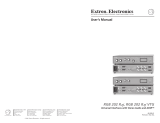AMX FG1052-16 Quick start guide
- Category
- Video switches
- Type
- Quick start guide
This manual is also suitable for
AMX FG1052-16 is a high-quality RGBHV (BNC) DAD (Distribution Amplifier Driver) Module that offers exceptional features for distributing and enhancing analog RGBHV signals. With its 1:6 distribution capability, it allows you to effortlessly distribute a single RGBHV input to six separate outputs. Each output can be independently adjusted for gain and peaking, ensuring optimal performance for various cable lengths and display requirements.
The AMX FG1052-16 is designed to provide reliable and efficient signal distribution over standard cable runs of up to 250 ft. (76.
AMX FG1052-16 is a high-quality RGBHV (BNC) DAD (Distribution Amplifier Driver) Module that offers exceptional features for distributing and enhancing analog RGBHV signals. With its 1:6 distribution capability, it allows you to effortlessly distribute a single RGBHV input to six separate outputs. Each output can be independently adjusted for gain and peaking, ensuring optimal performance for various cable lengths and display requirements.
The AMX FG1052-16 is designed to provide reliable and efficient signal distribution over standard cable runs of up to 250 ft. (76.


-
 1
1
-
 2
2
AMX FG1052-16 Quick start guide
- Category
- Video switches
- Type
- Quick start guide
- This manual is also suitable for
AMX FG1052-16 is a high-quality RGBHV (BNC) DAD (Distribution Amplifier Driver) Module that offers exceptional features for distributing and enhancing analog RGBHV signals. With its 1:6 distribution capability, it allows you to effortlessly distribute a single RGBHV input to six separate outputs. Each output can be independently adjusted for gain and peaking, ensuring optimal performance for various cable lengths and display requirements.
The AMX FG1052-16 is designed to provide reliable and efficient signal distribution over standard cable runs of up to 250 ft. (76.
Ask a question and I''ll find the answer in the document
Finding information in a document is now easier with AI
Related papers
-
AMX FG1052-10 Quick start guide
-
AMX FG1052-22 Quick start guide
-
AMX AVS-MD-2424-847 User manual
-
AMX AVS-OP-1624-547 User manual
-
AMX AVS-OP-1616-560SD User manual
-
AMX AVS-OP-2020-117 User manual
-
AMX FG1040-452 Quick start guide
-
AMX AVS-PL-0404-345 User manual
-
AMX AVS-OCT-3248-560 User manual
-
AMX Distribution Matrix Octaire User manual
Other documents
-
Extron electronics RGB 201 Rxi User manual
-
Extron RGB 198 EU User manual
-
Extron RGB 168xi User manual
-
 Extron electronics RGB 202 Rxi VTG User manual
Extron electronics RGB 202 Rxi VTG User manual
-
Extron electronic DA RGBHV Series User manual
-
Extron electronics RGB 160 User manual
-
Extron DA4 RGBHV User manual
-
Extron electronics RGB 160xi User manual
-
Extron electronic Universal Interfaces RGB 130xi User manual
-
Extron RGB 470xi SC Series User manual


